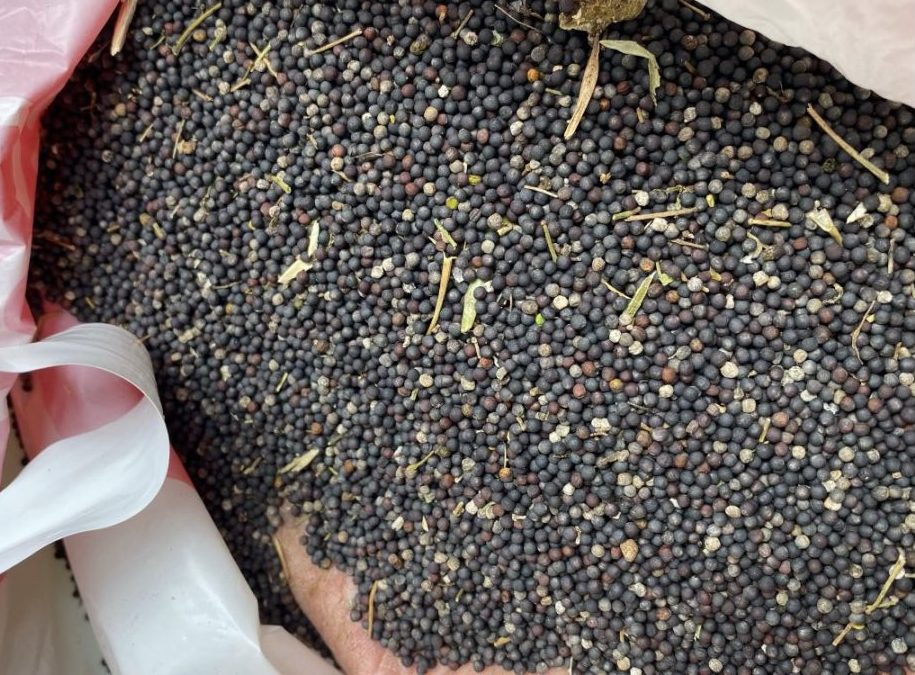
New segregations have opened to accommodate canola with up to 40 mouldy seeds per thousand. Photo: AOF
THE Australian Oilseeds Federation (AOF) has responded to industry queries regarding impacts of the wet season on canola quality in New South Wales and Victoria, and established two segregations with a tolerance for mouldy seed.
The seasonal standard of CSO1 (S) and CSO1a (S) both accept deliveries with the appearance of mould at 40 seeds per 1000, compared with the benchmark CSO1 and CSO1a grades which have maximum tolerance at 5 seeds per 1000.
Following yesterday’s announcement, segregations are live as of today.
In a statement, AOF executive officer Nick Goddard said the new segregations have come about following consultation with domestic crushers, exporters and bulk handlers to ascertain the extent of the quality impacts, and to assess options for dealing with weather-impacted canola.
“The broad consensus was to establish an additional 2022-23 seasonal standard for canola for this harvest only that will provide a consistent guideline to receiving and ultimately trading the majority of weather-impacted canola that falls outside CSO1 and CSO1a specifications,” Mr Goddard said.
This does not rule out industry creating its own grades and segregations outside AOF standards, and based on seasonal conditions in a regional area.
“It is important to note that the highly unusual weather circumstances this year have led to this extra-ordinary review and subsequent issuing of a 2022-23 seasonal grade at this point in the season.”
NSW’s canola harvest is thought to be less than 5 per cent complete, when more like 25pc can normally be expected by the second half of November.
Flooding, waterlogging, successive rain events and mild conditions are behind the delay as this La Niña season rolls on.
Benchmark AOF standards for CSO 1 and CSO 1a, as published August 1, remain effective for canola that meets those specifications.
Additional seasonal standards for canola have been incorporated into the Oilseed Standards Booklet available on the AOF website and can be accessed via the link.
The two S grades have the same minimum oil content at 42pc as the benchmark grades, and also the same minimum test weight at 62 kilograms per hectolitre.
Maximum tolerances in the seasonal grades at 3pc damaged seed, 5pc sprouted seed, and 2pc green seed are also unchanged from the benchmark grades.
GrainCorp comes out at evens
GrainCorp is Australia’s biggest canola crusher, and has issued a statement in response to its customers around the new segregations.
“Weather-affected canola’s a fact of life this harvest,” the GrainCorp statement said.
“We’ve participated in an industry-wide effort to ensure those loads can tip off.”
GrainCorp said without these new segregations to accommodate a higher incidence of mouldy seed, trucks would be rejected at delivery sites.
“For sites in the GrainCorp network south of the Werris Creek region in NSW through to Victoria, the new grades…will be the main receival grade at our sites.”
GrainCorp has said its Ardlethan and Narrandera sites in southern NSW, and Elmore and Quambatook in Victoria, are its only facilities expected to be taking in canola ticketed at the benchmark standard of 5 mouldy seeds per 1000.
“With the seasonal conditions also impacting wheat and barley quality, there is vast pressure on the number of segregations at our sites.”
The good news for growers is that deliveries into the seasonal segregations, open for both GM and non-GM at GrainCorp sites and ticketed as CANS and GMCS, will not incur a discount to the benchmark grades, and can be delivered against the benchmark CAN and CANG contracts.
One trade source said other canola buyers looked likely to follow suit and not penalise growers for modest amounts of mouldy seed.
“We have seen buyers happy to take much higher levels with only very modest discounts,” the source said, adding that mould seen thus far did not affect oil levels, and cases of live moulds/mycotoxins on the seed coat to impact meal quality were yet to come to light.
Source: AOF, GrainCorp

HAVE YOUR SAY